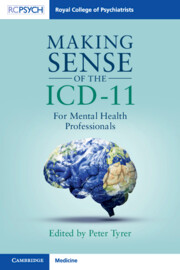Book contents
- Making Sense of the ICD-11
- Making Sense of the ICD-11
- Copyright page
- Contents
- Contributors
- Introduction
- Chapter 1 Development and Innovation in the ICD-11 Chapter on Mental, Behavioural and Neurodevelopmental Disorders
- Chapter 2 ICD-11 + DSM-5 = A Diagnostic Babel
- Chapter 3 Schizophrenia or Other Primary Psychotic Disorders
- Chapter 4 Mood Disorders
- Chapter 5 Disorders Specifically Associated with Stress
- Chapter 6 Disorders Due to Substance Use
- Chapter 7 Child and Adolescent Psychiatric Disorders
- Chapter 8 Anxiety and Fear-Related Disorders and Obsessive–Compulsive and Related Disorders
- Chapter 9 Personality Disorders
- Chapter 10 Disorders of Intellectual Development
- Chapter 11 Eating Disorders
- Chapter 12 Mental Health Classifications in Primary Care
- Index
- References
Chapter 1 - Development and Innovation in the ICD-11 Chapter on Mental, Behavioural and Neurodevelopmental Disorders
Published online by Cambridge University Press: 13 October 2023
- Making Sense of the ICD-11
- Making Sense of the ICD-11
- Copyright page
- Contents
- Contributors
- Introduction
- Chapter 1 Development and Innovation in the ICD-11 Chapter on Mental, Behavioural and Neurodevelopmental Disorders
- Chapter 2 ICD-11 + DSM-5 = A Diagnostic Babel
- Chapter 3 Schizophrenia or Other Primary Psychotic Disorders
- Chapter 4 Mood Disorders
- Chapter 5 Disorders Specifically Associated with Stress
- Chapter 6 Disorders Due to Substance Use
- Chapter 7 Child and Adolescent Psychiatric Disorders
- Chapter 8 Anxiety and Fear-Related Disorders and Obsessive–Compulsive and Related Disorders
- Chapter 9 Personality Disorders
- Chapter 10 Disorders of Intellectual Development
- Chapter 11 Eating Disorders
- Chapter 12 Mental Health Classifications in Primary Care
- Index
- References
Summary
This chapter describes the context of the 11th Revision of the International Classification of Diseases (ICD-11) related to mental health. It contains an explanation of the procedure adopted in making this revision, some background to the field trials and their results, and a brief account of the main changes; many of which are amplified in the later chapters. A detailed account of the changes in the ICD-11 as compared with the ICD-10 has been published elsewhere,1 as has a detailed comparison of the ICD-11 and the DSM-5.2
Information
- Type
- Chapter
- Information
- Making Sense of the ICD-11For Mental Health Professionals, pp. 5 - 16Publisher: Cambridge University PressPrint publication year: 2023
References
Accessibility standard: Unknown
Why this information is here
This section outlines the accessibility features of this content - including support for screen readers, full keyboard navigation and high-contrast display options. This may not be relevant for you.Accessibility Information
- 2
- Cited by
